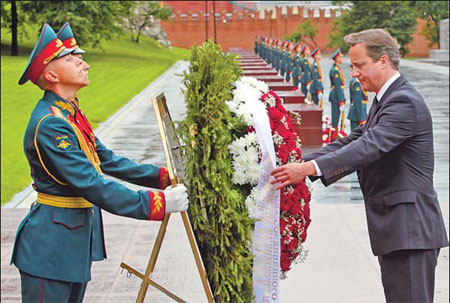Diplomatic and Military Affairs
UK, Russia to mend ties
Updated: 2011-09-14 08:14
(China Daily)
|
Britain's Prime Minister David Cameron takes part in a wreath laying ceremony at the Tomb of the Unknown Soldier by the Kremlin Wall, in Moscow, on Monday. [Agence France-Presse] |
MOSCOW - An attempt by British Prime Minister David Cameron to thaw relations with Russia brought few results on Monday and yielded a curt response from the Kremlin over the fate of British oil firm BP, underlining lingering distrust.
On the first visit by a British prime minister since Kremlin critic Alexander Litvinenko died in London from poisoning by radioactive polonium-210 in 2006, Cameron set out to improve business ties as a way to warm up relations.
But behind the smiles, and even a Kremlin joke about an apparent KGB attempt to recruit Cameron on a trip to the Soviet Union 26 years ago, the visit produced no big breakthroughs.
Just 200 million pounds ($318 million) worth of business deals were announced, and Cameron received a cool response from the Kremlin about the fate of BP, whose Moscow offices were raided by court bailiffs two weeks ago and which has a long history of problems in Russia.
President Dmitry Medvedev illustrated the gulf that remained between London and Moscow by saying he would never extradite the Russian man whom British prosecutors want to put on trial for Litvinenko's murder.
"This will never happen," Medvedev said after talks in the Kremlin, adding that Russia had concerns about corruption and the court system in Britain.
Prime Minister Vladimir Putin, who has not met a British leader since 2007, was at least 10 minutes late for a separate meeting with Cameron although he praised trade ties with Britain when he did arrive.
"Britain is our old trade and economic partner, and we have lots to discuss," said Putin, who is widely expected to run in the 2012 presidential election.
As Russia's paramount leader, Putin's consent is essential if Cameron is going to have any success in improving Russian ties, which plunged to a post-Cold War low after Litvinenko's death.
Ill feeling over Litvinenko's murder runs as deep as ever and officials on both sides had said Cameron's visit was unlikely to achieve many tangible results.
Cameron, who is trying to bolster Britain's weak recovery by boosting exports to fast-growing emerging markets such as Russia, India and China, said Britain's position on the murder was unchanged but that the issue should not hinder trade.
"It remains an issue between Britain and Russia, and we haven't changed our position about that. The Russians haven't changed their position, but I don't think that means that we freeze the entire relationship," Cameron said.
The British government wants to open effective channels of communication to both Medvedev and Putin to reinforce the position of British business in Russia.
Cameron was accompanied by a high-powered 24-strong business delegation, including BP Chairman Bob Dudley, Royal Dutch Shell Chief Executive Peter Voser and Rolls-Royce Chairman Simon Robertson.
Cameron discussed concerns with Putin and Medvedev about a raid last month of BP's Moscow office by court bailiffs seeking documents for a court case and also raised breaches of human rights in Russia.
Reuters
E-paper

Way over the moon
High inflation rockets mooncake prices out of orbit for mid-autumn festival
From death matches to child's play
Tomb raiders remain a menace
Kicking for joy
Specials

Singing success
Western musicians bring much-needed impetus to live performance industry

Salary bonanza for bosses
Top boss gets 8.78 million euros a year, far more than the State enterprise CEO with highest pay

Kicking for joy
Swedish college student represents China in Taekwondo championships

